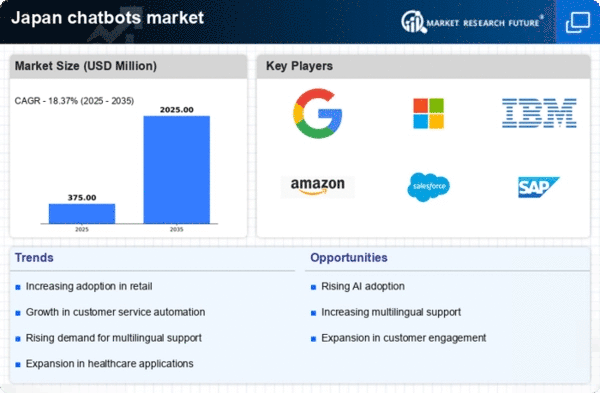Growing E-commerce Sector
The growing e-commerce sector in Japan is a significant driver for the chatbots market. With online shopping becoming increasingly popular, businesses are turning to chatbots to enhance customer engagement and streamline the purchasing process. Data reveals that chatbots can boost conversion rates by as much as 25% by providing instant assistance and personalized recommendations. This trend is particularly relevant in the retail sector, where customer experience is paramount. As e-commerce continues to flourish, the chatbots market is expected to thrive, with more retailers integrating chatbot technology to meet the demands of their online customers.
Rising Demand for Automation
The chatbots market in Japan is experiencing a notable surge in demand for automation across various sectors. Businesses are increasingly recognizing the efficiency and cost-effectiveness that chatbots offer in handling customer inquiries and support. According to recent data, the automation of customer service processes can reduce operational costs by up to 30%. This trend is particularly evident in industries such as retail and finance, where rapid response times are crucial. As companies strive to enhance customer satisfaction while minimizing expenses, the integration of chatbots into their operations appears to be a strategic move. The chatbots market is thus likely to witness accelerated growth as more organizations adopt these automated solutions to streamline their services.
Technological Advancements in AI
Technological advancements in artificial intelligence (AI) are significantly influencing the chatbots market in Japan. Innovations in natural language processing (NLP) and machine learning are enabling chatbots to understand and respond to customer queries with greater accuracy and relevance. This evolution is fostering a more engaging user experience, which is essential for retaining customers in a competitive landscape. The market data suggests that AI-driven chatbots can improve customer engagement rates by approximately 40%. As businesses increasingly seek to leverage these technologies, the chatbots market is poised for substantial growth, driven by the demand for smarter, more capable chatbot solutions.
Increased Focus on Customer Experience
An increased focus on customer experience is profoundly impacting the chatbots market in Japan. Companies are recognizing that delivering exceptional service is crucial for maintaining a competitive edge. Chatbots are being deployed to enhance customer interactions, providing quick responses and personalized support. Research indicates that businesses prioritizing customer experience can achieve revenue growth of up to 10%. This emphasis on improving customer satisfaction is driving the adoption of chatbot technology, as organizations seek to create more engaging and responsive service environments. Consequently, the chatbots market is likely to see continued expansion as firms invest in solutions that elevate the customer experience.
Shift Towards Omnichannel Communication
The shift towards omnichannel communication is reshaping the chatbots market in Japan. Consumers now expect seamless interactions across various platforms, including social media, websites, and messaging apps. This trend necessitates the development of chatbots that can operate effectively across multiple channels, providing a consistent customer experience. Market analysis indicates that companies implementing omnichannel strategies can enhance customer retention by up to 20%. As businesses adapt to these changing consumer preferences, the chatbots market is likely to expand, with a focus on creating versatile chatbot solutions that cater to diverse communication needs.
















